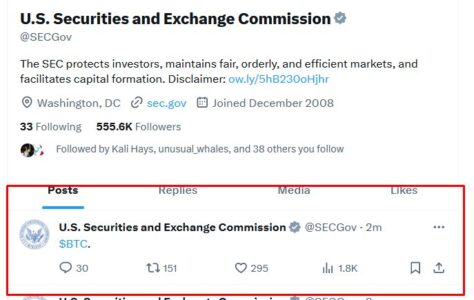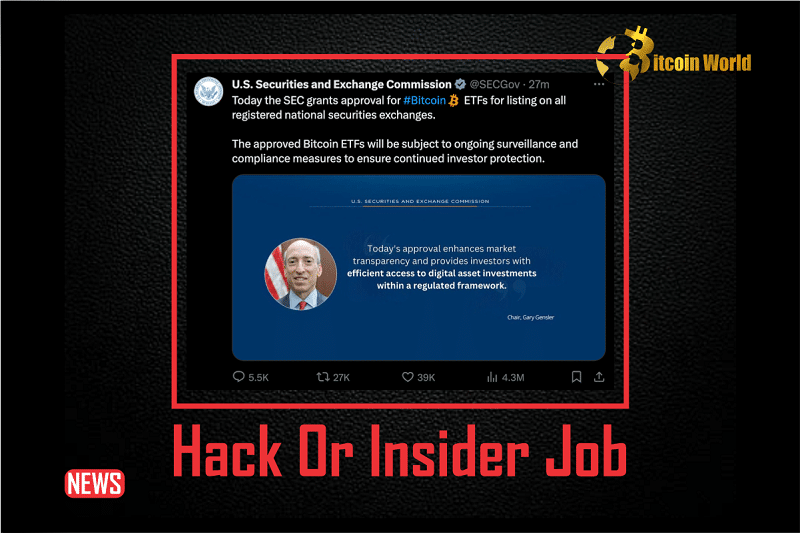Hold on to your hats, crypto enthusiasts! The digital world was sent into a frenzy when the SEC’s official X (formerly Twitter) account declared approval for a spot Bitcoin ETF. Yes, you read that right – for a few heart-stopping moments, it seemed like the crypto dream was finally coming true. But like a rug pull in the wild west of DeFi, it turned out to be a fake. A digital mirage. The aftermath? A rollercoaster of emotions, a flash crash in the Bitcoin price, and a crypto community demanding answers. Was it a sophisticated hack, a clumsy insider mistake, or something more calculated? Let’s dive into the digital rabbit hole and unravel this SEC X account mystery.
The Tweet Heard ‘Round the Crypto World (That Wasn’t True)
Imagine the scene: crypto Twitter is buzzing, anticipation for a spot Bitcoin ETF is at fever pitch, and then – BAM! – a tweet from the official SEC account drops the news: approval granted. Bitcoin’s price jumps, dreams of mainstream adoption dance in traders’ heads, and then… the SEC steps in to deliver a cold shower of reality. It was fake. The tweet, the excitement, the price surge – all based on a phantom post. According to the SEC, their X account was compromised, and an “unidentified person” had infiltrated their digital fortress to post the false proclamation.
The immediate impact was nothing short of dramatic:
- Bitcoin price surged by 2.2% upon the fake announcement.
- When the SEC clarified it was fake, BTC plummeted by 4.5% in minutes.
- This whirlwind event triggered an estimated $210 million crypto market meltdown, as Bitcoinworld reported.
X (Twitter) itself launched an investigation, confirming the SEC account compromise. Their findings pointed towards a vulnerability related to a phone number linked to the account. As X’s safety account stated: “We can confirm that the account @SECGov was compromised… Based on our investigation, the compromise was… due to an unidentified individual obtaining control over a phone number associated with the @SECGov account through a third party.”
See Also: US Senators Seek Gary Gensler’s Report On X Breach, Deadline Monday
The SEC’s @SECGov account was compromised. An unauthorized tweet was issued. The SEC has disabled 2FA on the account. The SEC will work with law enforcement and our partners across government to investigate the matter. https://t.co/oQMpoXrqpr
— Gary Gensler (@GaryGensler) January 9, 2024
2FA Fail and Community Skepticism: A Recipe for Conspiracy Theories?
Adding fuel to the fire, X revealed that the SEC account didn’t have two-factor authentication (2FA) enabled at the time of the breach. In today’s digital age, especially for a high-profile institution like the SEC, this revelation was met with disbelief and sparked a wave of questions. The crypto community, known for its skepticism and penchant for decentralization, didn’t hold back. Some even humorously attempted to guess the SEC’s associated email address, highlighting the perceived lax security.
Someone get the intern fired https://t.co/Bv5HRoT5uO pic.twitter.com/lQWpL0u51o
— Plantain Capital 🍌 (@Cap_Plantain) January 9, 2024
Beyond the memes and jokes, a serious debate ignited: was this truly an external hack, or was there more to the story? The speed and nature of the SEC’s response, coupled with the 2FA oversight, raised eyebrows and fueled speculation about an inside job or even a deliberate attempt to manipulate the market or delay the spot Bitcoin ETF decision.
Hack or Hoax? Decoding the SEC’s X Debacle
Who Really Posted *That* Tweet?
The internet, as always, responded with a mix of humor and serious investigation. Memes flooded social media, with figures like Autism Capital jokingly pointing fingers at Sam Bankman-Fried, while others quipped about BitBoy taking matters into his own hands.
BREAKING: Sam Bankman-Fried has hacked the SEC twitter account and announced Bitcoin Spot ETF approval from jail. pic.twitter.com/85QjSb3H9e
— Autism Capital 🧩 (@AutismCapital) January 9, 2024
BREAKING: BitBoy caught trying to take matters into his own hands pic.twitter.com/a5sl1tzb2t
— Brad Mills ⚡️ (@bradmillscan) January 9, 2024
However, amidst the jokes, some prominent voices in the crypto space raised critical questions. Jameson Lopp, for instance, astutely noted, “Gary never said the SEC’s account was compromised by an external hacker. It could have been compromised by internal incompetence.” This observation shifted the focus from a sophisticated external attack to potential internal lapses.
Gary never said the SEC's account was compromised by an external hacker. It could have been compromised by internal incompetence.
— Jameson Lopp (@lopp) January 9, 2024
The speed of the SEC’s reaction also fueled skepticism. VanEck advisor Gabor Gurbacs questioned the near-instantaneous response, tweeting, “I am no cybersecurity expert, but it seems almost impossible to notice a bad tweet from an org account, tweet from the chair’s account to correct it, then recover a hacked social media account, then tweet about the incident and respond to it from the hacked account, all in a few minutes…”
I am no cybersecurity expert, but it seems almost impossible to notice a bad tweet from an org account, tweet from the chair’s account to correct it, then recover a hacked social media account, then tweet about the incident and respond to it from the hacked account, all in a few minutes… https://t.co/tU7FwYdDRC
— Gabor Gurbacs (@gaborgurbacs) January 9, 2024
Gurbacs even ventured into the realm of conspiracy, asking, “What if this is an inside job? Is the only way to stop or delay a Bitcoin ETF to create an event like this?” This line of questioning highlights the deep-seated distrust some in the crypto community hold towards regulatory bodies.
See Also: Hacker Exploited SEC Chair’s Phone Number To Post Fake Spot BTC ETF Approval: X
Evidence for a Bitcoin Fan Hacker?
Despite the insider job theories, some intriguing details support the hack narrative. Just before the fake ETF approval tweet, the SEC account mysteriously tweeted “$BTC” and then deleted it – an odd and uncharacteristic move. Furthermore, eagle-eyed observers noticed that the SEC account’s liked posts included two that were unrelated to the SEC’s official business, another deviation from typical behavior.

Analyzing the fake post itself also reveals clues. The use of the hashtag #Bitcoin, while seemingly innocuous, is not typical of SEC communications. Additionally, the attached image lacked the standard SEC logo and capitalization conventions seen in their official media, suggesting a lack of familiarity with SEC branding guidelines.
Whodunnit? The Crypto Mystery Continues
The SEC’s X account incident has gifted the crypto world with an early 2024 whodunnit. While the commission firmly denies any internal involvement and insists it was a compromise, the questions linger. Was it a prankster with a knack for social engineering? A disgruntled individual seeking to sow chaos? Or could there be more layers to this digital onion than meets the eye?
For now, the investigation is ongoing, and the spot Bitcoin ETF decision remains officially pending. One thing is certain: this event has not only highlighted the vulnerabilities of even high-profile social media accounts but has also amplified the crypto community’s inherent skepticism and demand for transparency. As we await further details, the SEC’s X saga serves as a stark reminder of the power of social media in the crypto age and the ever-present need for robust digital security. Stay tuned, crypto detectives – this story is far from over.
Disclaimer: The information provided is not trading advice, Bitcoinworld.co.in holds no liability for any investments made based on the information provided on this page. We strongly recommend independent research and/or consultation with a qualified professional before making any investment decisions.


